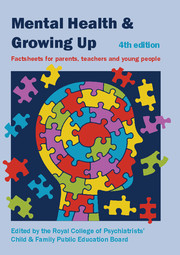Book contents
- Frontmatter
- Contents
- Contributors
- Factsheets for young people
- Factsheets for parents, carers and anyone who works with young people
- 1 Good parenting
- 2 The restless and excitable child
- 3 Dealing with tantrums
- 4 Children who soil or wet themselves
- 5 Sleep problems in childhood and adolescence
- 6 Behavioural problems and conduct disorder
- 7 Attention-deficit hyperactivity disorder (ADHD)
- 8 The child with general learning disability
- 9 Specific learning difficulties
- 10 Autism and Asperger syndrome
- 11 Depression in children
- 12 Worries and anxieties: helping children to cope
- 13 Divorce or separation of parents: the impact on children and adolescents
- 14 Death in the family: helping children to cope
- 15 The emotional cost of bullying
- 16 Traumatic stress in children
- 17 Domestic violence: its effects on children
- 18 Child abuse and neglect: the emotional effect
- 19 Drugs and alcohol: what parents need to know
- 20 Self-harm in young people
- 21 Psychosis
- 22 Schizophrenia
- 23 Bipolar disorder in children and adolescents
- 24 Obsessive–compulsive disorder in children and young people
- 25 Eating disorders in young people
- 26 Chronic physical illness: the effects on mental health
- 27 Medically unexplained physical symptoms
- 28 Chronic fatigue syndrome: helping your child get better
- 29 Parental mental illness: the problems for children
- 30 Who's who in CAMHS
7 - Attention-deficit hyperactivity disorder (ADHD)
from Factsheets for parents, carers and anyone who works with young people
Published online by Cambridge University Press: 02 January 2018
- Frontmatter
- Contents
- Contributors
- Factsheets for young people
- Factsheets for parents, carers and anyone who works with young people
- 1 Good parenting
- 2 The restless and excitable child
- 3 Dealing with tantrums
- 4 Children who soil or wet themselves
- 5 Sleep problems in childhood and adolescence
- 6 Behavioural problems and conduct disorder
- 7 Attention-deficit hyperactivity disorder (ADHD)
- 8 The child with general learning disability
- 9 Specific learning difficulties
- 10 Autism and Asperger syndrome
- 11 Depression in children
- 12 Worries and anxieties: helping children to cope
- 13 Divorce or separation of parents: the impact on children and adolescents
- 14 Death in the family: helping children to cope
- 15 The emotional cost of bullying
- 16 Traumatic stress in children
- 17 Domestic violence: its effects on children
- 18 Child abuse and neglect: the emotional effect
- 19 Drugs and alcohol: what parents need to know
- 20 Self-harm in young people
- 21 Psychosis
- 22 Schizophrenia
- 23 Bipolar disorder in children and adolescents
- 24 Obsessive–compulsive disorder in children and young people
- 25 Eating disorders in young people
- 26 Chronic physical illness: the effects on mental health
- 27 Medically unexplained physical symptoms
- 28 Chronic fatigue syndrome: helping your child get better
- 29 Parental mental illness: the problems for children
- 30 Who's who in CAMHS
Summary
How common is ADHD?
About 2 to 5% of school-age children can have ADHD. Boys are more commonly affected than girls.
What causes it?
We do not know exactly what causes this disorder, but ADHD can run in families. It is more likely in children who have significant traumatic experiences in young age. Sometimes parents feel blamed for not having controlled their child, but there is no evidence that poor parenting directly causes ADHD. However, it is important to note that parents can play a crucial role in helping and managing a child with ADHD.
What are the symptoms?
Attention-deficit hyperactivity disorder can present with different behaviours depending on the age, setting (i.e. school, home, playground) and even motivation (e.g. when doing an activity or something a child likes).
Not all children have all the symptoms. This means some can just have problems with poor attention, whereas others are mainly hyperactive.
• Children with problems of attention can appear forgetful, distracted, not seeming to listen, disorganised, take ages to start doing things and then when they do, they rarely finish them.
• Children with hyperactivity seem restless, fidgety, full of energy, ‘always on the go’. They may seem loud, noisy, with a continuous chatter.
• Children with symptoms of impulsivity do things without thinking. They have difficulty waiting for their turn in games or in a queue, and interrupt people in conversation.
What other problems can a person with ADHD have?
Children with ADHD can have other problems such as learning difficulties, autism, conduct disorder, anxiety and depression. Neurological problems such as tics, Tourette syndrome and epilepsy can also be present. Children with ADHD can have problems with coordination or social skills and seem to be disorganised.
How long will they have ADHD?
About one in three children with a diagnosis of ADHD can grow out of their condition and not require any treatment when they are adults. The majority who receive specialist treatment tailored to their needs may benefit considerably. They will have been able to catch up with their learning, improve their school performance and make friends.
- Type
- Chapter
- Information
- Mental Health and Growing UpFactsheets for Parents, Teachers and Young People, pp. 64 - 68Publisher: Royal College of PsychiatristsPrint publication year: 2013



